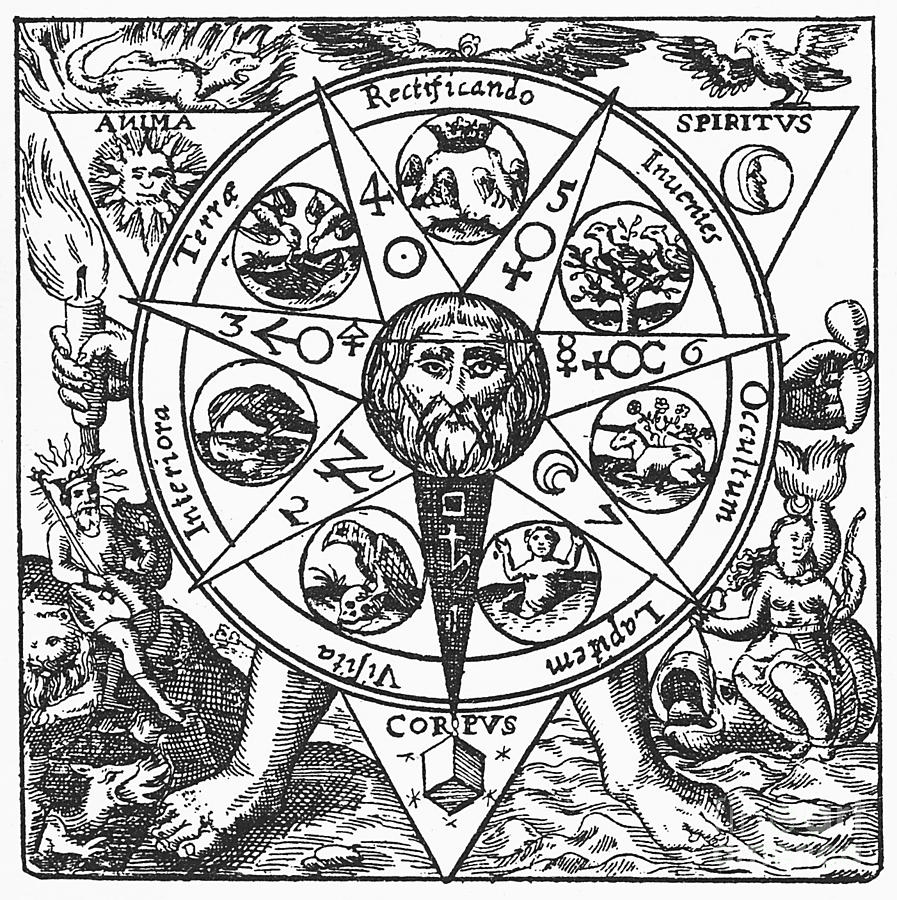The Art of Alchemy, which is still practiced by some today, had
it’s heyday back in the middle ages- and was relegated to basements and to the
underground because it was considered to be a Dark Art. Alchemy was not banned
or illegal, but it was frowned upon by the church authorities. We must remember
that in the Middle Ages and the Medieval period that the Church was the
governing factor of all things. The Church and God were the highest authority
in the land.
 Now, Alchemy was also highly esoteric, and as well as being
concerned with the transmutation of base metals into gold, it was also about
one’s relationship with nature and the natural world. It took into account the
four elements – Earth, Air, Fire and Water – and the manipulation of these
elements to produce the desired results. With this in mind, Alchemy was deemed
heretical and at odds with the Church. Because as the church saw it, only God
could command the elements…and certainly not a mere mortal… thus, why it was
hidden from view by ordinary society. If we look at some of the alchemical
symbolism, we can see that their language was highly symbolic, and conveyed
esoteric knowledge. The Alchemist’s needed to shield their knowledge from the
Church authorities, but was there another reason for this secrecy. It was as if
the Alchemist’s were hiding a great secret. Was there something more to Alchemy
than met the eye? Well, we also know that Alchemist’s were searching for the
elixir of life which could extend a person’s life.
Now, Alchemy was also highly esoteric, and as well as being
concerned with the transmutation of base metals into gold, it was also about
one’s relationship with nature and the natural world. It took into account the
four elements – Earth, Air, Fire and Water – and the manipulation of these
elements to produce the desired results. With this in mind, Alchemy was deemed
heretical and at odds with the Church. Because as the church saw it, only God
could command the elements…and certainly not a mere mortal… thus, why it was
hidden from view by ordinary society. If we look at some of the alchemical
symbolism, we can see that their language was highly symbolic, and conveyed
esoteric knowledge. The Alchemist’s needed to shield their knowledge from the
Church authorities, but was there another reason for this secrecy. It was as if
the Alchemist’s were hiding a great secret. Was there something more to Alchemy
than met the eye? Well, we also know that Alchemist’s were searching for the
elixir of life which could extend a person’s life.
So, was this ‘life elixir’ something more than for this
physical life. Was the art and language of the Alchemist’s so esoteric and
difficult to decipher because within it was hidden a great secret that could
only be known to the Alchemist’s themselves? It has always been a theory that
Alchemy was an allegory for something much greater, and that was the search for
our own soul. The search for our own Spiritual Self that would allow us to gain
immortality through transcending our own mortality and realising our Spiritual
Self. This is what Spiritual transformation really is.
Today, the world is much more liberal in its outlook, and
widely accepts Spirituality and the knowledge that we all have a Soul, although
back in the Middle Ages and Medieval period it was highly dangerous to look
beyond the views of the Church. We are very lucky in the modern age that life
has changed and progressed, and differing views on Religion and Spirituality
are highly accepted.
Keep Searching for your own elixir.
Peace and Love always,
Ben.
